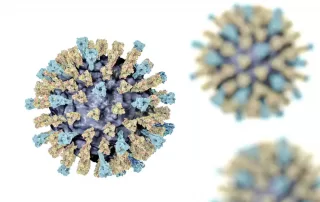Overview
Measles is a highly contagious viral infection caused by the measles virus. It spreads through respiratory droplets when an infected person coughs or sneezes. The virus can remain infectious in the air for up to two hours after the infected person has left the area.
Symptoms typically appear 10-12 days after exposure and include high fever, cough, runny nose, and inflamed eyes (conjunctivitis). A few days later, a characteristic red, blotchy rash develops, starting on the face and spreading down the body. Other symptoms can include white spots inside the mouth known as Koplik spots.
Measles can lead to serious complications, particularly in young children, pregnant women, and individuals with weakened immune systems. These complications include ear infections, diarrhoea, pneumonia, encephalitis (brain inflammation), and, in severe cases, death.
Vaccination is the most effective way to prevent infection. The measles, mumps, and rubella (MMR) vaccine is typically administered to children in two doses, providing lifelong immunity in most cases. Maintaining high vaccination coverage in the community is crucial to preventing outbreaks.



